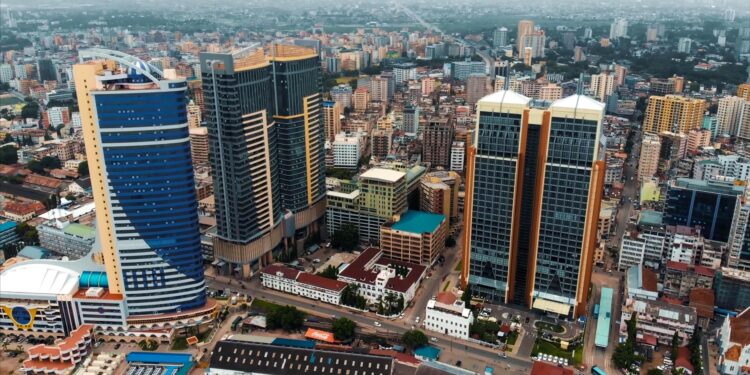Why Dar es Salaam’s Port Revival Matters for Rwanda’s Trade Future
As East Africa positions itself as a burgeoning hub for trade and commerce, the revitalization of Dar es Salaam’s port emerges as a pivotal development for neighboring countries, particularly Rwanda. Once a critical artery for regional trade, Dar es Salaam has long faced challenges that hindered its potential. However, recent investments and upgrades aimed at modernizing the port promise not only to enhance its capacity but also to serve as a lifeline for landlocked nations like Rwanda. With an eye toward reducing transportation costs and increasing the efficiency of goods movement, the implications of this port revival could reshape Rwanda’s trade landscape, boosting economic growth and forging stronger ties within the East African Community. In this article, we explore the significance of Dar es Salaam’s port improvements and their potential to transform Rwanda’s trade future.
Dar es Salaam Port as a Gateway to Regional Trade Expansion for Rwanda
The revitalization of Dar es Salaam Port is set to significantly alter the landscape of regional trade, particularly for Rwanda. As Rwanda continues to position itself as a pivotal hub in East Africa, the strategic location and enhanced capacity of the port offer a multitude of advantages. This includes:
- Reduced Transportation Costs: Direct access to cargo shipping lanes will lower freight expenses for Rwandan importers and exporters.
- Increased Trade Volumes: With improved infrastructure, the port’s capacity to handle larger shipments will facilitate a surge in trade flows.
- Boost to Exports: Enhanced connectivity to global markets will promote Rwandan products, particularly agricultural exports.
Furthermore, the collaboration between Rwanda and Tanzania aims to streamline border processes and enhance customs operations, effectively minimizing delays. Specific initiatives include:
| Initiative | Description |
|---|---|
| One-Stop Border Posts | Facilitating faster trade clearance between Rwanda and Tanzania. |
| Digital Trade Platforms | Implementing technology to ease trading processes and enhance transparency. |
As Rwanda capitalizes on these developments at Dar es Salaam Port, it not only strengthens its economic footing but also encourages regional integration, ultimately fostering a vibrant trading environment in East Africa.
Economic Implications of Enhanced Port Operations for Rwanda’s Import-Export Dynamics
The revival of Dar es Salaam’s port carries significant economic implications for Rwanda’s trade landscape, particularly concerning import-export dynamics. Enhanced port operations are expected to streamline logistical processes, reducing bottlenecks and allowing for faster turnaround times for goods. Key advantages of this development include:
- Lower shipping costs: Improved efficiency may lead to a reduction in transportation expenses for Rwandan traders.
- Increased trade volume: With easier access to international markets, local exporters can expand their reach and increase sales.
- Diversification of supply sources: A revitalized port means Rwanda can import a wider variety of goods from economically diverse regions.
Moreover, this port revival is likely to impact Rwanda’s Gross Domestic Product (GDP) positively. As trade routes become more accessible, the ease of doing business will foster foreign investment and economic partnerships. The following table illustrates projected economic growth scenarios resulting from enhanced port operations:
| Year | Projected GDP Growth (%) | Trade Volume Increase (%) |
|---|---|---|
| 2024 | 5.5 | 12 |
| 2025 | 6.0 | 15 |
| 2026 | 6.5 | 18 |
This positive trajectory highlights the crucial role that improved maritime infrastructure will play in shaping Rwanda’s economic future as a regional trade hub.
Strategic Recommendations for Rwanda to Leverage Opportunities from Port Developments
To fully capitalize on the ongoing revival of the Port of Dar es Salaam, Rwanda should consider implementing a multi-faceted strategy aimed at increasing its trade efficiency and economic connectivity. Key recommendations include:
- Investment in Transport Infrastructure: Enhance road and rail networks to ensure seamless connectivity between the port and Rwandan borders.
- Establishing Trade Agreements: Foster bilateral trade agreements with Tanzania to reduce tariffs and streamline cross-border operations.
- Facilitating Logistics Centers: Develop logistics hubs around key trade routes to simplify warehousing and storage for exporting goods.
Moreover, forging partnerships with private sector players in logistics and shipping can provide Rwanda with invaluable expertise and resources. It is also essential for the Rwandan government to:
- Implement Digital Trade Platforms: Create integrated digital platforms that facilitate real-time tracking and monitoring of goods in transit.
- Enhance Customs Efficiency: Employ technology to reduce clearing times at customs, improving turnaround for imports and exports.
- Promote Export-Driven Sectors: Identify and support sectors within Rwanda that can leverage the port’s capabilities, like agriculture and manufactured goods.
| Recommendation | Expected Outcome |
|---|---|
| Investment in Transport Infrastructure | Improved trade flow from port to Rwanda |
| Establishing Trade Agreements | Lower costs and faster access to markets |
| Facilitating Logistics Centers | Efficiency in handling goods |
| Implement Digital Trade Platforms | Greater transparency and tracking |
The Way Forward
In conclusion, the revival of Dar es Salaam’s port stands as a pivotal development not just for Tanzania, but also for Rwanda’s trade landscape. As Kigali positions itself as a regional hub for commerce and logistics, improved access to this strategic maritime gateway can catalyze economic growth, enhance supply chains, and foster deeper regional integration. By reducing transportation costs and transit times, Rwanda stands to benefit significantly from the increased efficiency and capacity that a revitalized port can offer. As both nations move forward, collaboration in port management and infrastructure development will be essential in maximizing these benefits. Ultimately, the future of Rwandan trade hinges on leveraging this investment in Dar es Salaam, signaling a promising horizon for cross-border commerce in East Africa. The stakes are high, and the time to act is now.














